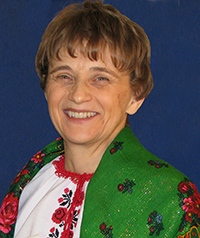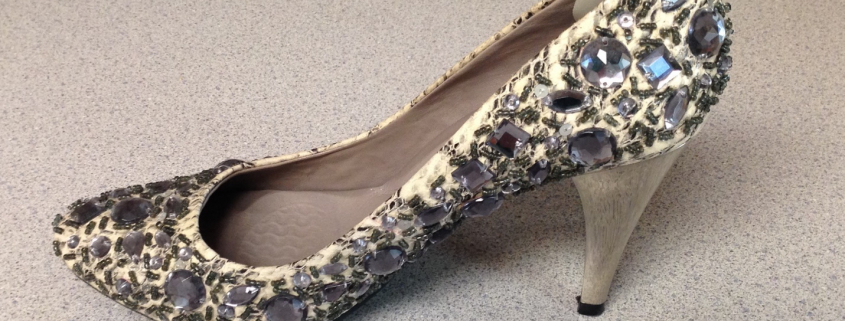A Pointed Shoe: The Challenges of Securing Arts Funding in Northern Saskatchewan
As an independent artist, and on behalf of both groups, I have applied for numerous arts grants. Some have been successful, and many have not. I don’t give up easily.
I carefully place an elegant shoe next to the laptop and data video projector on the table at the front of the room. The shoe has a 4-inch heel and is covered in sparkling glass stones and beads. I am about to make a presentation to Business for the Arts on arts and culture funding in northern Saskatchewan, and the shoe will help me make a point – two points, actually; but first, a bit of background.
I am a long-time volunteer with the La Ronge Arts Council and current president of the Wild Rice Writers’ Group. I am also a writer and oral storyteller. As an independent artist, and on behalf of both groups, I have applied for numerous arts grants. Some have been successful, and many have not. I don’t give up easily.
I realize that dollars are tight, the process is very competitive, and some projects are just more deserving than others. I always try to find out from funding agencies what juries have said about our applications, so I may know how to make them stronger. Some of those answers make me shake my head.
A decade ago, the La Ronge Arts Council applied for a Saskatchewan Arts Board project grant. We asked for assistance to commission a classical music composition that would celebrate northern Saskatchewan, and we wanted to engage a string quartet from Saskatoon to premiere the music in La Ronge. We were rejected. The jury wanted to know why we needed to bring in a quartet from Saskatoon. Why weren’t we using local musicians?
In our next application, we carefully explained that although we did have an accomplished local classical music composer, there were no string quartets in town to choose from. We were turned down again. “What does this project have to do with northern culture?” the jury asked. What “northern” projects did get funded, I wondered? Did any place north of Prince Albert get approved? The consultant told me, “Yes! Tisdale.” Sigh. (Check your maps, folks. Tisdale’s in central Saskatchewan.)
I told you I don’t give up easily. Eventually, we found other funding and were able to achieve what we set out to do. The music was composed and performed locally, and performed again in Saskatoon. Several years later, a successful Arts Board project grant allowed us to produce a CD of that music. Gareth L. Cook’s Songs of Woods, Rock and Water garnered a Western Canada Music Award nomination, and has been enjoyed by listeners around the globe.
With the help of another project grant, the Wild Rice Writers’ Group was able to work with Cook and playwright R.P. MacIntyre as they collaborated on a musical play with a “northern” bush pilot theme. In the Air was staged by Dancing Sky Theatre in 2011 in Meacham, Prince Albert and Moose Jaw.
With both these endeavours, we saw the positive impact the investment of a few thousand dollars could have, and were devastated when the Arts Board eliminated project grants. So, when the Writers’ Group wanted to publish Gordie Carle’s small collection of poems rescued from a house fire that destroyed the rest of his writing, we were left with no choice but to apply through the artsVest program that matches sponsorships from businesses.
This brings me back to the purpose of my presentation and the shoe. We did go the artsVest route to publish Bush Poems for Nora in 2012. Our group is the only organization in the Northern Sport, Culture and Recreation District to have been approved for the grant. Now, as I’ve repeatedly said, I don’t give up easily, but even I swore, “Never again!” No one else in the north is applying, either. Business for the Arts wants to know why.
Many of my suggestions for improvement to the program would apply across the province, so let me focus on three that illustrate why it does not work in the north.
- Do not require applicants to be incorporated or registered non-profits. This disadvantages and sets up barriers for small, but vibrant, volunteer-driven groups, typical of the north. We already had a good track record, but in order to apply, we had to “partner” with an organization that fit the criteria. This added no value and required unnecessary layers of communication and paperwork.
- Do not limit the securing of sponsorships to a specific geographical area. Our sponsors all had to be from within the boundaries of our own Sport, Culture and Recreation District. In our case, if we wanted to seek sponsorship from a mainstream publisher, we were out of luck; none exist in La Ronge or Beauval or Fond du Lac…
- Do not set a minimum level of contribution as a requirement for matching. In the north, we’re not dealing with corporations, but mostly family-owned businesses, our neighbours, who get asked to support everything from school trips to sports teams to cultural events. One donor generously gave us $100, but artsVest would not match it; to be matched, sponsorships must be at least $200.
This finally brings me to the shoe. It fits someone perfectly, but it does not fit me or my northern arts colleagues. While artsVest might be successful in other parts of the country, it makes us feel like the ugly step-sisters in the Cinderella story, trying to force our feet into someone else’s glass slipper. Equal is not necessarily equitable. Would Business for the Arts be willing to “walk a mile in our moccasins” and reconsider its criteria?
I might wear moccasins; the ‘pointed’ shoe belongs to a treaty member of the Lac La Ronge Indian Band. Stereotypes about the north should not determine what gets funded. In the south, do only projects that reflect “southern culture” get funded?
Post Script: I note that the Saskatchewan Arts Board has introduced new Explore and Connect grants. We are hopeful equitable criteria and enlightened juries will allow northern arts projects to compete fairly for funding.
PPS: On a personal note, as an oral storyteller, I also feel like an ugly step-sister when I try to force storytelling grant applications into Literary or Theatre categories, but that’s a topic for another time…

Linda Mikolayenko is an oral storyteller who specializes in folk tales and legends from the Ukrainian tradition, but also tells stories from around the world to suit a particular theme. She has told stories to audiences of all ages at schools, libraries and storytelling festivals across Canada and New York State. Her writing has been published in a variety of newspapers and magazines, including the Globe and Mail, Reader’s Digest and Prairies North. She currently lives in Air Ronge, in northern Saskatchewan. More information can be found on her website. (Photo Credit: Hilary Johnstone) |
